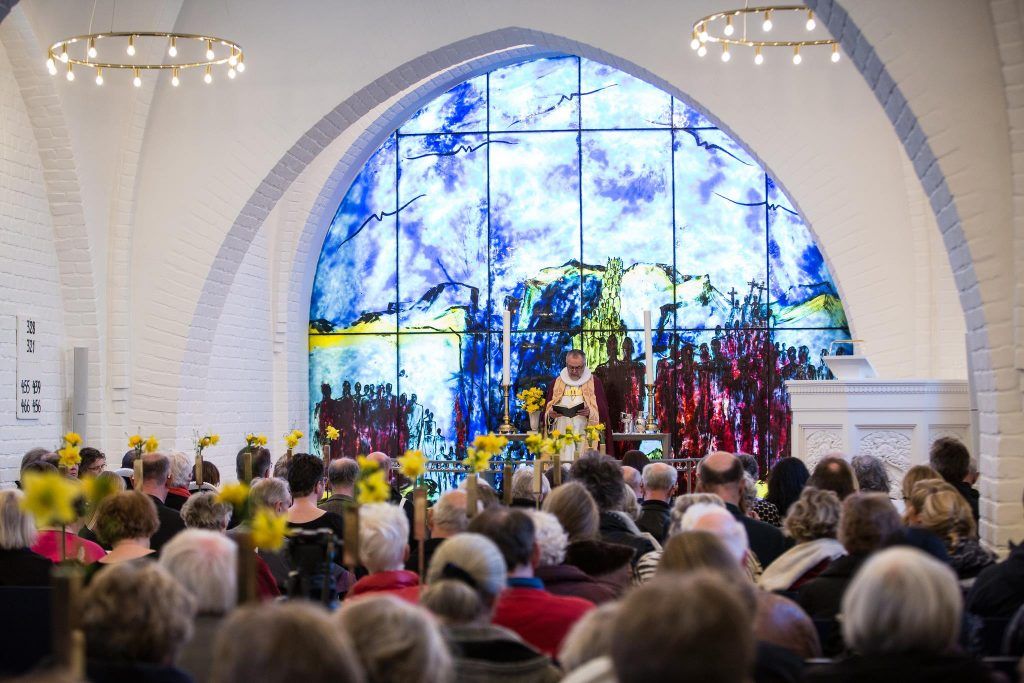Folkekirken, the Danish people’s church, is busy getting ready for its busiest weekend of the year. And no, we’re not talking about Christmas!
And before you ask, it has nothing to do with ‘Herrens Veje’ (the way of the lord), the new DR1 drama series about a family of priests starring Lars Mikkelsen, although this is undoubtedly drawing attention to the challenge Folkekirken faces to remain relevant in this modern age.
The word ‘church’ is deeply rooted in Christianity. It is derived from the Greek word ‘kyriake’ – the house of the lord – and historically it has been a place of great reverence, univocal in its purpose.
In secular Denmark, however, the term ‘church’ is taking on a different meaning. No longer a house of the lord, it is fast becoming a house of the people, as Danes shape the location into a more convivial surroundings – in short, it’s become hygge.
Danish Day of the Dead
As if the abundance of candles weren’t enough to entice Danes through the door, churches are adapting their services to modern needs, and this is reflected in attendance numbers.
In recent years, the most popular service hasn’t been Christmas Eve or Easter Sunday, but rather All Saints’ Day on the first Sunday of November.
Danish people, following a similar tradition to Mexico’s Día de los Muertos (Day of the Dead), use the service to remember the passing of their loved ones. On November 5, therefore, twice as many people are expected to attend church than on a normal Sunday.
Attendances dying
Nevertheless, as of 1 January 2017, some 75.9 percent of Danes were members of Folkekirken, which means they continue to pay an average 0.93 percent of their income to the body.
And even though numbers have slipped from 82.6 percent in 2007 – since 2016 leaving can be easily accomplished online, while various atheist campaigns have played their part – the future of the church seems assured financially.
But as a place of worship, attendances have never been lower, with only 10 percent regularly attending church.
Membership still strong
According to Hans Raun Iversen, an associate professor of systematic theology at Copenhagen University, many choose to be a member of the church because it is comfortable.
While their attendance at regular services might have declined, Danes turn out in large numbers to attend traditional ceremonies, such as funerals, baptisms, confirmations or weddings. As a result, 75 percent visit a church at least once a year.
“We continue being members as we are most at ease with that,” Iversen told CPH POST. “We are weak believers and we belong to the church without believing much in that belonging.”
With membership of the church comes the right to hold the aforementioned ceremonies free of charge. An increasing number of Danes are discovering that death can come at a high price if their deceased relative was not a member.
Church is an extra
Attending church, Iversen further contends, is an “extra” and not really a requirement for being Christian – particularly among those who live their lives according to Christian values and regard the whole world as the domain of God.
“Regular church attendance is not necessary for all. For those doing God’s work in the world, church may act as a filling station for occasional visits,” said Iversen.
“Thus, the Danes never attend church more than is necessary for practical or social reasons.”
Church’s changing face
Faced with low attendances, churches are finding new ways to engage with the public spiritually – particularly in this new digital age in which people can’t bear to be apart from their smartphones.
Since January 2017, Folkekirken has been offering spiritual support online. This includes free, anonymous pastoral care for church members – a complete rethinking and revitalisation of the concept of pastoral care.
Church buildings, meanwhile, are filling up thanks to events conducive to their quiet nature, such as classical music recitals.
New churches – which are still occasionally being built! – are designed to fit in with modern sensibilities. A new one scheduled to open in 2019 by Teglholmen in Copenhagen Harbour has been designed with recreational activities as well as religious ones in mind.
People in charge
After two millennia of subservience to the Christian church, the Danish people, it would appear, are calling the shots.
“Nothing in the church is done anymore without being molded by special Danish context and tradition,” said Iversen.
“Whereas others are celebrating Luther’s 500-year anniversary this year, we are celebrating ourselves. It is our jubilee, not Luther’s.”














